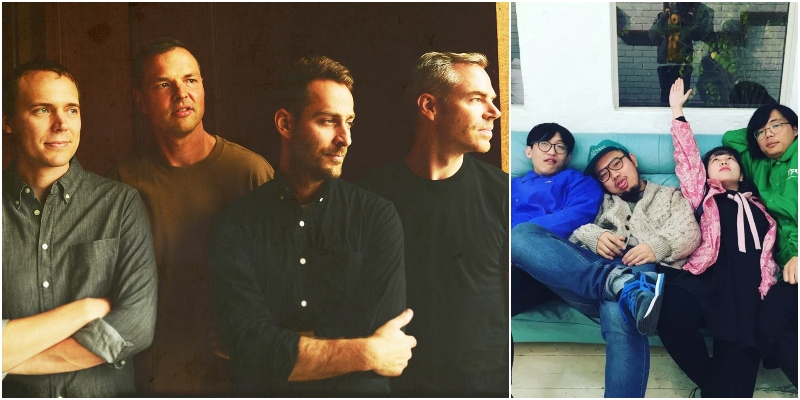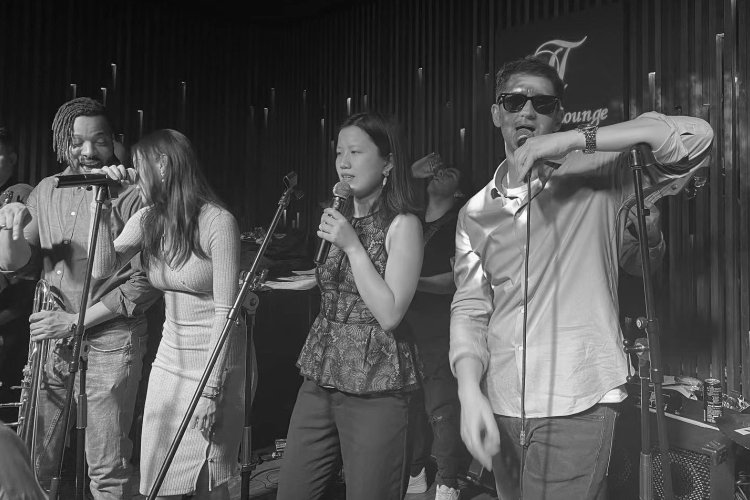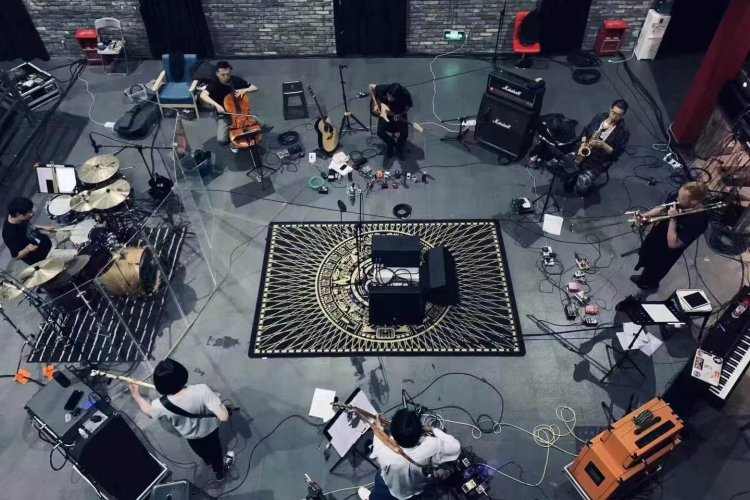When Worlds Collide: The Unlikely Story of How American Football Came to Tour With Chinese Football
“It’s like a superhero timeline – an alternative universe where these kids are named Chinese Football and they’re actually a popular band on the other side of the world … and we’re just American Football,” muses Mike Kinsella. The architect behind the iconic band American Football, whose 1999 debut LP became a touchstone for the Midwest emo movement, is as modest as they come. But he’s not entirely wrong – most Chinese audiences had no knowledge of the cult band being alluded to when the Wuhan-based emo rock juggernauts settled on their name.
If you had to place money on whether or not you could picture American Football facing off against local trailblazers Chinese Football in a Beijing music venue, I’d reckon no one would be forgoing his or her home anytime soon. But as one ecstatic Reddit commenter put it: “It is as the prophecy foretold.” Said divine event will grace Earth later this month at Omni Space on Tuesday, Jul 30, as American Football embarks on their first-ever China tour, with Chinese Football in tow. Full circle we come.

Where Are We Now?
“When Chinese Football started, I couldn’t imagine that American Football would reform, let alone release new music – [and] I thought Chinese Football would last maybe three or four years like most of my previous bands,” Chinese Football’s frontman and guitarist Xu Bo says giddily.
It’s not too outlandish a thought, considering it was essentially the same path that the Illinois-bred American Football took two decades ago. After releasing their debut in the heyday of the internet, a time when “An MP3 would take an hour to download,” according to Kinsella, the band quietly dissolved. While Kinsella kept busy with other music projects (most notably his long-running solo project Owen) the love for American Football’s exceptionally unique, jazz-inflected approach to the genre, chock-full of bold time signatures and melancholy brass work, only grew among the next generation of young adolescents finding their way.
Their debut has dated well, continuing to draw fans for its heart-on-its-sleeve rendering of love lost. When asked where he thinks its popularity lies, Kinsella states, “That first album is very naive and honest. My voice is cracking the whole time. You can hear flubs on the instruments. It just sounds (like) a real portrayal of what was going on at that time. It’s almost like this little time capsule of young adults going through transition – a cross-section. Every time young adults go through transitions if they find music they sort of gravitate toward, so as we kept getting older and growing away from that, new kids were discovering it for themselves.”
Fifteen years after the rueful and delicate tracks of American Football’s first LP needled their way into the minds of music lovers and lovers alike, their original label Polyvinyl was busy digging up several old recordings and unreleased tracks to compose a reissue. Within hours of its release, the Polyvinyl crashed due to the deluge of traffic. “It took us not playing for 15 years,” jokes Kinsella, “we took the long way around.”
The band’s newfound success led to a few live shows, eventually snowballing into a world tour before they found their way back into the studio. “It just sort of happened organically. Like, ‘this is fun, let's keep doing it,’ to, ‘well this is fun, but we can’t just play these same 12 songs if we want to go back to these cool cities and hang out.’”
While the band isn’t totally satisfied with their sophomore release (“we knew we were going in a direction but we didn’t quite get there”) it propelled them into the stratosphere and instilled in the band a newfound creative output that did not rely on paying tribute to their younger selves, nor more importantly, pander to the fans that had given them a second lease of life.
“We sort of got rid of the idea that we had to please people in that way, and just wrote music we wanted to make. We didn’t have to answer any questions – ‘What happened to those awkward teenagers who are now grown men?’ We’re just grown men now.”
The band’s LP 3, which dropped earlier this year, proved them right. More comfortable in exploring deeper emotions and sonically complex ideas, the band demonstrated that new sense of maturity through lush arrangements and a hattrick of female guest vocalist (including Slowdive's Rachel Goswell). The result is an album that’s grandiose and gorgeous as it is indelible and haunting. As Xu Bo puts it, “They’ve thrown away some of the burdens of the past and are more daring to pursue the voice that resides in their mind. As the cover art of the album suggests, they have completely left the house of their youth and are looking into the wider world.”

Here Comes a New Challenger
Over to 11,000 kilometers away, a teenage Xu Bo was having a hard time finding something musically to latch onto. That was until he discovered indie label flag bearers like Jade Tree, Deep Elm, and American Football’s label Polyvinyl, Bo stating that, “once I find something I love, I stick with it.” In those sounds he found a home and began to thrive on the comforts it had to offer: “I soaked up everything from American Football and other Kinsella bands. For me, they’re a group of very creative guys, rooted in the punk scene, but not sticking to the traditional voices and stereotypes found within there, which I appreciated very much.”
Emerging on the scene in 2011, Xu Bo admits that he and his bandmates didn’t put much thought into the name Chinese Football. “It was a joke really. Nobody knew who American Football was at the time. It was a bit like hearing a punch line that only your friends knew ... most people assumed we were referencing China’s meager men’s soccer team – it was an interesting contrast.”
Unlike their idols, however, Chinese Football’s star rose fast. Their self-titled debut, which dropped in 2015, garnered a fair bit of attention not only among Chinese listeners but niche online music circles around the world on account of their tender indie-pop sensibilities crossed with a raw emo rock ethos. Soon enough, the band was touring Japan all the while refining their sound, injecting it with hot-bloodied angst, bouncing math rock-infused rhythms, and airtight hooks. “During our first China tour, I found that many people would sing along to our songs, which made me more confident in the power of words.” Nowadays you can’t catch them without rabid fans chanting choruses alongside the band.
Their 2017 EP Here Comes a New Challenger further solidified Chinese Football’s reputation as one of the indie scene’s most sought-after acts. The band now routinely sells out shows across China as well as traveling further afield, aided by the network of bands and artists that Xu Bo has built via his label Sango Records. “I’m also shocked and curious about how our music, and music of this relatively small genre, has been slowly recognized by Chinese fans. I always felt lucky.”

Luck is certainly one way to look at it. Rather, I see it as a testament to the groundwork that American Football laid out 20 years ago and how a group of earnest Midwest US musicians was able to connect with four similarly broody kids in a place as seemingly disparate as China. It has not only injected life in the underground music scene here in China, instigating one of the country’s most rousing bands, but has also paved the way for the original architects to redefine themselves all these years later.
Chinese Football will join American Football at Omni Space on Tuesday, Jul 30. Tickets are RMB 220 advance or RMB 260 on the door.
READ: Raise a Glass to (And Insert Your Earplugs For) Temple and DDC's Joint Anniversary Week
Images: Rolling Stone, courtesy of New Noise/Wild Records, Cactus Music Festival







